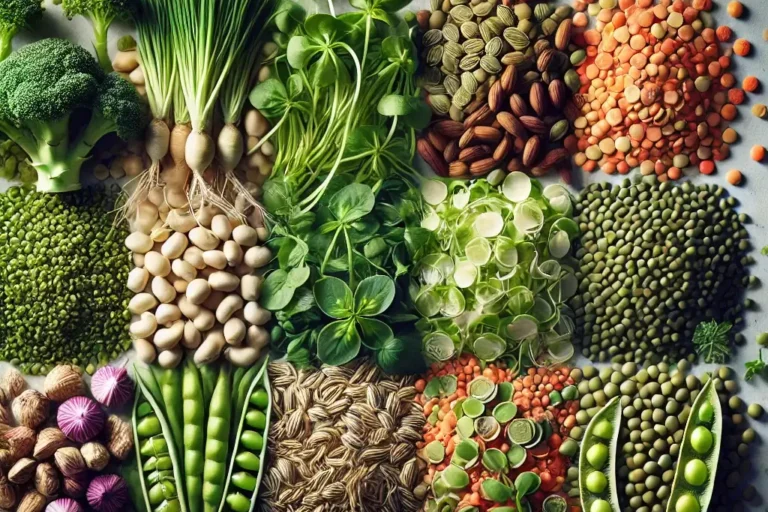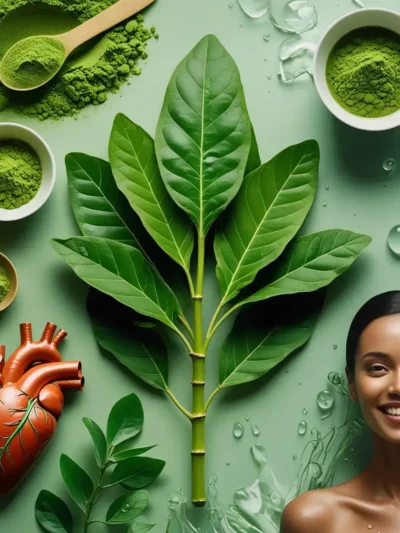You edible sprouts they are small in size but giants in nutrition!
They contain a powerful concentration of vitamins, minerals, enzymes and antioxidants, becoming essential allies for those seeking more energy, immunity and nutritional balance.
If you want to add more vitality and health to your daily life, you're in the right place!
📌 In this guide, you will learn:
✅ What are sprouts and why are they so healthy?
✅ The 6 Best Edible Sprouts, its benefits and how to consume them
✅ How to grow sprouts at home
✅ How to store them correctly
✅ Complete comparison table
✅ Detailed FAQ with the main questions
Now, get ready for a deep dive into the **most nutritious sprouts you can include in your diet. food!
🌱 What are sprouts and why are they so healthy?
The sprouts are germinated seeds that have undergone an activation process, significantly increasing their nutritional content and making the nutrients more bioavailable.
🔹 Why are sprouts considered superfoods?
✅ Increased nutrients: The germination process multiplies the seed's nutrients.
✅ Ease of digestion: Natural enzymes make the sprouts easier on the body.
✅ Low glycemic index: Excellent option for diabetics and those who want to balance their glucose levels.
✅ Rich in antioxidants: They combat premature aging and strengthen immunity.
✅ Live foods: They provide energy and vitality to the body.
Now that we understand the power of sprouts, let's explore The 6 Best Edible Sprouts in detail!
🥗 The 6 Best Edible Sprouts for Your Health
1. Alfalfa Sprouts – The King of Detoxification

THE alfalfa sprouts (Medicago sativa) is one of the most popular in the world of healthy eating. Its mild flavor and light texture make it a perfect complement to many recipes.
🔹 Powerful Benefits
✅ Detoxifies the body: Helps eliminate toxins from the liver and kidneys.
✅ Regulates cholesterol: Reduces LDL (bad cholesterol) levels.
✅ Helps with hormonal balance: Contains natural phytoestrogens.
✅ Strengthens immunity: Rich in antioxidants and essential minerals.
🔹 Nutritional Richness
✔ Vitamins: A, C, K, B complex.
✔ Minerals: Calcium, iron, magnesium, potassium.
✔ Fibers: They improve digestion and intestinal health.
🔹 How to Consume?
- Salads and sandwiches: Add freshness and crunch.
- Detox smoothies: Combine with green juices.
- Cold soups: Excellent option for hot days.
💡 Curiosity: Alfalfa sprouts have been used for centuries in traditional Chinese medicine for blood purification!
2. Sunflower Sprouts – Energy and Plant Protein

THE sunflower sprout (Helianthus annuus) is one of the best sources of vegetable protein among the edible shoots. Its flavor is slightly sweet and its texture is crunchy.
🔹 Powerful Benefits
✅ Increases energy: Source of proteins and healthy fats.
✅ Strengthens muscles: Rich in essential amino acids.
✅ Improves skin and hair: Contains vitamin E and antioxidants.
🔹 Nutritional Richness
✔ Protein: More than 20% of its composition.
✔ Fats healthy: Omega-6 and omega-9.
✔ Minerals: Zinc, iron, phosphorus.
🔹 How to Consume?
- Salads and protein bowls.
- Added to omelets and wraps.
- In post-workout energy juices.
💡 Curiosity: Sunflower sprouts are used in diets to gain muscle mass due to their protein content!
3. Bamboo Shoots – Rich in Fiber and Lightness

THE bamboo shoot (Bamboo spp.) is widely consumed in Asian cuisine and stands out for being rich in fiber, light and crunchy.
🔹 Powerful Benefits
✅ Improved digestion: High fiber content that regulates the intestine.
✅ Help in weight loss: Few calories and great satiety power.
✅ Protection against inflammation: Rich in antioxidants.
🔹 Nutritional Richness
✔ Fibers: They improve digestive health and intestinal transit.
✔ Vitamins: C, E, and some of the B complex.
✔ Minerals: Potassium, phosphorus and iron.
🔹 How to Consume?
Need cooking before consumption, being great at soups, risottos and stews.
💡 Curiosity: Bamboo is a plant that grows very quickly and is extremely sustainable, making its shoots an excellent ecological alternative.
4. Lentil Sprouts – Complete and Sustainable Nutrition

THE lentil sprout (Culinary lens) is one of the most rich in vegetable proteinsIts firm texture and mild flavor make it an excellent option to complement salads and hot dishes.
🔹 Powerful Benefits
✅ Regulates blood sugar: Ideal for those looking to control their glycemic index.
✅ Source of iron and proteins: Suitable for vegetarian and vegan diets.
✅ Nervous system support: Contains vitamin B6 and magnesium.
🔹 Nutritional Richness
✔ Proteins: Highly protein, ideal for muscle regeneration.
✔ Fibers: Contributes to intestinal health.
✔ Minerals: Iron, phosphorus and magnesium.
🔹 How to Consume?
- Salads: In fresh and crunchy recipes.
- Soups and curries: Excellent for enhancing hot dishes.
- In breads and cakes: Use sprouts to enrich pasta.
💡 Curiosity: Lentils are one of the oldest plants cultivated by humans, with over 10,000 years of history!
5. Bean Sprouts – Source of Vitamins and Antioxidants

THE bean sprout (Phaseolus vulgaris) is widely known for its use in oriental dishes, especially in Chinese cuisine. Its mild flavor and crunchy texture are ideal for adding freshness to dishes.
🔹 Powerful Benefits
✅ Strengthens cardiovascular health: Rich in flavonoids that help reduce blood pressure.
✅ Improves digestion: Its high fiber content facilitates intestinal transit.
✅ Immune system support: Contains vitamins A, C and E.
🔹 Nutritional Richness
✔ Vitamins: A, C, E, K.
✔ Minerals: Potassium, calcium, iron.
✔ Fibers: Regulates the intestine and improves nutrient absorption.
🔹 How to Consume?
- Salads and wraps: To give freshness and crunchiness.
- Soups and stews: In hot dishes, where the sprout maintains its texture.
- In oriental dishes: Adding to the famous yakimeshi or chop suey.
💡 Curiosity: Bean sprouts are one of the quickest sprouts to germinate, which makes them easy to grow at home.
6. Wheatgrass – The Healthy Eating Classic

THE wheat sprout (Triticum aestivum) and the wheat plant embryo, and is highly nutritious, being an excellent source of fiber, antioxidants and B vitamins.
🔹 Powerful Benefits
✅ Detoxifying: Improves liver and kidney function.
✅ Improves digestive health: Rich in soluble and insoluble fiber.
✅ Support for the cardiovascular system: Contains essential fatty acids and antioxidants.
🔹 Nutritional Richness
✔ Vitamins: B1, B2, B3, B6, E.
✔ Minerals: Iron, magnesium, phosphorus.
✔ Antioxidants: That combat cellular aging.
🔹 How to Consume?
- Juices and smoothies: Great for boosting your immune system.
- In cereals and energy bars: It can be added to enrich recipes.
- Wholemeal bread and homemade pasta: Healthy base ingredient for homemade preparations.
💡 Curiosity: Wheat sprouts are the main ingredient in green wheat juice, one detox supplement popular among healthy eating practitioners
📊 Comparison Table of the 6 Edible Sprouts
| Bud | Main Benefits | Main Nutrients | How to Consume |
|---|---|---|---|
| Alfalfa | Detoxification, cholesterol control | Vitamins A, C, K, B, Calcium, Iron, Magnesium | Salads, smoothies, soups |
| Sunflower | Increased energy, muscle strengthening | Proteins, Omega-6, Zinc, Iron | Salads, omelets, post-workout juices |
| Bamboo | Improves digestion, weight control | Fiber, Vitamins C, E, Potassium, Iron | Soups, risottos, stews |
| Lentil | Regulates blood sugar, source of iron | Protein, Fiber, Iron, Magnesium | Salads, soups, breads |
| Bean | Strengthens the cardiovascular system, digestion | Vitamins A, C, E, K, Fiber, Iron | Salads, stews, soups |
| Wheat | Detoxifies, improves cardiovascular health | Vitamins B1, B2, B3, B6, E, Iron, Magnesium | Juice, smoothies, whole grain breads |
Conclusion
You edible sprouts they are powerful and natural foods that can transform your health and provide a superior nutrition.
They are easy to grow, delicious and offer a wide variety of benefits for those looking for well-being and quality of life.
Try the 6 sprouts mentioned in this guide and incorporate them into your daily diet! Start your journey towards a healthier and more vital life.
Click here to explore even more recipes and tips on how to use sprouts in your menu!
Below is a scientific article published in the journal Research, Society and Development, which addresses the nutritional quality, microbiological safety and potential application of edible sprouts in new products:
Frequently Asked Questions
Edible sprouts are germinated seeds that have an extremely high nutritional value, with enzymes and antioxidants that help with dietary balance and strengthening immunity.
Alfalfa sprouts help detoxify the body, regulate cholesterol and strengthen immunity, in addition to being rich in vitamins and minerals such as calcium, iron and magnesium.
Sunflower sprouts can be consumed in salads, protein bowls, post-workout energy drinks and even in omelets and wraps.
Bamboo shoots are rich in fiber and excellent for digestion, while bean sprouts are a good source of vitamins and antioxidants to strengthen immunity.
Yes, shoots like bamboo shoots are low in calories and have great satiety power, helping with healthy weight control.
Yes! You can grow sprouts at home quickly and easily. Just use sprout-safe seeds and provide an adequate environment with light and humidity.
Lentil sprouts are rich in protein and help control blood sugar, making them ideal for vegetarian and vegan diets.
Sprouts should be stored in the refrigerator in a sealed container and can be consumed within 3 to 5 days to ensure freshness and flavor.
Yes, sprouts have a higher concentration of nutrients, including vitamins, minerals and antioxidants, making them more bioavailable superfoods.
Alfalfa sprouts are an excellent choice for beginners because they are easy to grow and have a mild flavor, as well as providing a variety of health benefits.









